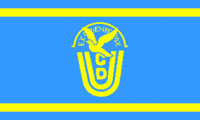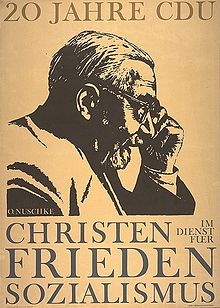- Christian Democratic Union (East Germany)
-
Christian Democratic Union of Germany
Christlich-Demokratische Union Deutschlands
Leader Andreas Hermes
1945
Jakob Kaiser
1945-1947
Otto Nuschke
1948-1957
August Bach
1957-1966
Gerald Götting
1966-1989
Wolfgang Heyl
1989 (acting)
Lothar de Maizière
1989-1990Founded 1945 Dissolved October 1990 (merged with the West German CDU.) Headquarters East Berlin, German Democratic Republic Ideology Christian democracy,
Socialism (adopted after its Sixth Party Congress in October 1952 until 2 November 1989 when Gerald Götting was deposed as CDU chairman by inner party reformers)Political position Centre-right (1949-1952, 1989-1990)
Left-wing (1952-1989)National affiliation National Front International affiliation N/A Official colors Blue, Yellow The Christian Democratic Union of Germany (German: Christlich-Demokratische Union Deutschlands (CDU)) was an East German political party founded in 1945. It was part of the National Front with the Socialist Unity Party of Germany (SED) until 1989.
It contested the free elections in 1990 as an arm of the West German Christian Democratic Union, into which it merged after German reunification later that same year.
Contents
Party politics
 CDU poster showing Otto Nuschke and reading 20 years of CDU and Christians in service of peace and Socialism
CDU poster showing Otto Nuschke and reading 20 years of CDU and Christians in service of peace and Socialism
The CDU was primarily made up of devout middle class Christians. Originally similar to its West German counterpart, it transformed itself into a loyal partner of the Communists after its Sixth Party Congress in October 1952. At this gathering, it officially embraced socialism which affirmed the line of "Christian realism" and declared the CDU "a Socialist party without any limitations" (Otto Nuschke).
In the 22 "Theses on Christian Realism", the CDU committed itself to the "Socialist reorganisation of Society" (1. edition, 1951). Emphasising the "exemplary realisation" of Karl Marx's "teaching on building a new, better social order" in the USSR, it was declared that Socialism offered at the time "the best opportunity for the realisation of Christ's demands and for exercising the practical Christianity". The programme also asserted Christian Democrats' support for working class' leading role in establishing socialism, a development which the CDU regarded from its 6th Congress on as historically necessary and consistent".[1]
Its deputies, like all other parties, consistently voted for the government proposals in the Volkskammer, The only exception was the March 9, 1972 vote on the abortion law, when there were 14 'nays' and 8 absentees among the CDU deputies.
In the 1950s, the leader of the CDU was Otto Nuschke, a former member of the German Democratic Party during the Weimar Republic. He was a close ally of the Communists. After Nuschke's death, the party was led by August Bach for a shorter period and in 1966 Gerald Götting was elected as the Chairman. Before that he had been the party's General Secretary. Götting, himself a Volkskammer chairman in the 1970s, carried on and elaborated the pro-government line.
Götting remained Chairman and an SED ally until Erich Honecker was deposed in favour of Egon Krenz in October 1989. On 2 November 1989, Götting was deposed as CDU chairman by inner party reformers. In December 1989 Lothar de Maizière, a lawyer and deputy chairman of the Evangelical Church Synod of East Germany, was elected chairman. From that point on the party deposed (and later expelled) its top figures and would later support the GDR's annexation by West Germany.
In March 1990, the CDU won the first (and as it turned out, only) free general elections and became the biggest party in the People's Chamber. In April de Maizìere became Prime Minister of the GDR, heading a grand coalition that immediately set about reuniting the country with the West.
In October 1990, the East German CDU merged with the West German CDU.
Chairmen
Part of a series on Christian democracy Politics portal Andreas Hermes 1945 Jakob Kaiser 1945–1947 Otto Nuschke 1948–1957 August Bach 1957–1966 Gerald Götting 1966–1989 Wolfgang Heyl 1989 (acting) Lothar de Maizière 1989–1990 General secretaries
Georg Dertinger 1946–1949 Gerald Götting 1949–1966 Martin Kirchner 1989–1990 East German CDU Politicians
- Sabine Bergmann-Pohl (Last Head of State of the GDR)
- Emil Fuchs (Theologian)
- Karl Grobbel (Co-founder of the Berlin Conference of European Catholic's)
- Hubertus Guske (General Secretary of the Berlin Conference of European Catholics)
- Ernst Lemmer (co-chairman of the CDU in 1947)
- Angela Merkel (deputy spokesperson of Lothar de Maizière's government and the united Germany's first female Chancellor)
- Herbert Schirmer (Minister of Culture 1990)
- Max Sefrin (Deputy Prime Minister)
- Luitpold Steidle (Minister of Health Care)
- Heinrich Toeplitz (Supreme Court of the GDR)
- Heinz Winkler (Minister of Reconstruction)
See also
References
- ^ Christlich-Demokratische Union Deutschlands (CDU) [Ost] by Ralf G. Jahn http://www.adel-genealogie.de/CDU-Ost.html#Kapitel6
External links
Categories:- Political parties in East Germany
- Political parties established in 1945
- Political parties disestablished in 1990
- Defunct political parties in Germany
- Defunct Christian political parties
- Christian socialism
- Christian democratic parties in Germany
Wikimedia Foundation. 2010.
